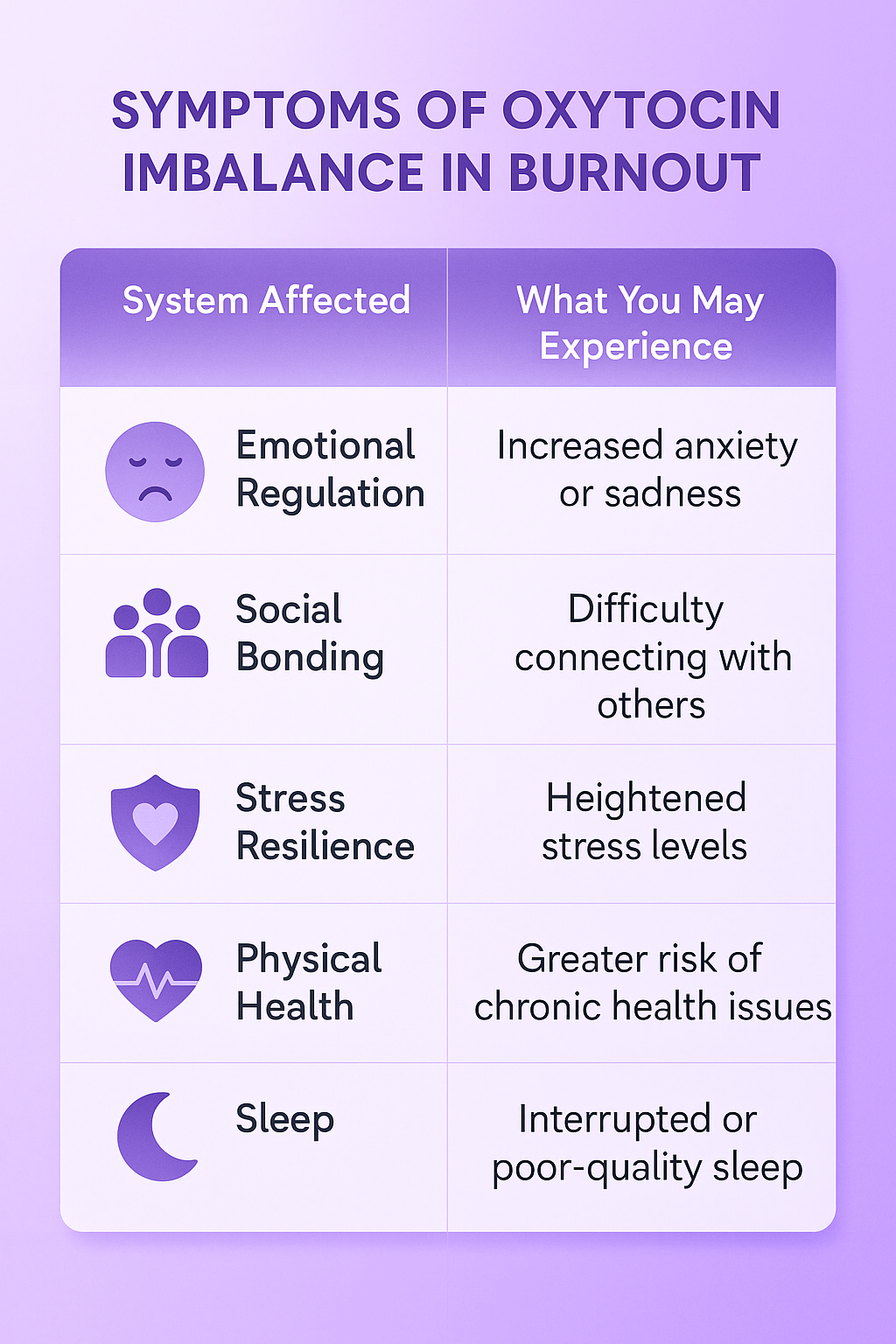Oxytocin and Burnout: How Stress Disrupts Your Brain’s Social and Emotional Glue
Do you ever feel emotionally numb, disconnected, or isolated during periods of high stress? Burnout may be disrupting one of your brain’s most essential bonding chemicals: oxytocin.
Known as the “love hormone” or “bonding hormone,” oxytocin plays a vital role in trust, empathy, social bonding, and emotional regulation. When burnout hits, oxytocin levels often plummet, leaving people feeling alone, anxious, and less connected to others.
This blog explores what oxytocin does in the brain, how burnout affects it, and how you can support healthy emotional connection and resilience.
What Is Oxytocin?
Oxytocin is a neuropeptide and hormone produced mainly in the hypothalamus and released by the posterior pituitary gland. It promotes:
Trust and empathy
Social bonding and attachment
Emotional stability
Stress buffering and relaxation
Oxytocin also works to inhibit the body’s stress response by calming the amygdala and suppressing the release of cortisol.
Oxytocin Pathways in the Brain
Oxytocin neurons in the hypothalamus project to multiple brain regions:
Amygdala: Reduces fear and anxiety
Nucleus accumbens: Promotes social bonding and emotional reward
Prefrontal cortex: Enhances empathy and moral decision-making
Hippocampus: Supports emotional memory and stress modulation
These pathways form the neurological foundation for emotional connection, compassion, and social resilience.
How Burnout Lowers Oxytocin Levels
1. Chronic Stress Suppresses Oxytocin Production
Prolonged activation of the hypothalamic-pituitary-adrenal (HPA) axis reduces oxytocin synthesis.
2. Social Withdrawal
Burnout often leads to emotional exhaustion and withdrawal from friends, family, and colleagues, which further decreases oxytocin release.
3. Heightened Cortisol Blocks Oxytocin Effects
Elevated cortisol from chronic stress interferes with oxytocin receptor sensitivity and signaling.
4. Impaired Stress Recovery
Low oxytocin levels weaken the body’s ability to calm the nervous system, leaving people stuck in fight-or-flight mode.
Symptoms of Oxytocin Imbalance in Burnout
Why Oxytocin Matters in Burnout
Oxytocin acts as a natural stress buffer. When levels are low:
People feel less socially supported
Anxiety and depression symptoms increase
Emotional exhaustion worsens
Physical and emotional health decline
Low oxytocin levels contribute to the deep loneliness and emotional numbness commonly reported in burnout.
Can You Restore Healthy Oxytocin Levels?
Yes. Research shows oxytocin is highly responsive to lifestyle changes and nurturing social behaviors.
1. Positive Social Interaction
Spend time with trusted friends and family
Engage in group activities or volunteering
2. Physical Touch
Hugs, hand-holding, massage, and even petting animals stimulate oxytocin release
3. Mindfulness and Meditation
Meditation, yoga, and deep breathing can reduce cortisol and indirectly boost oxytocin
4. Laughter and Shared Experiences
Enjoy lighthearted moments with loved ones to trigger oxytocin
5. Use MelodiaSync
EEG-guided relaxation tools like MelodiaSync help reduce stress and support the body’s natural hormone balance
Rebuild Your Emotional Connection
Burnout steals more than just energy, it can also rob you of the emotional warmth and connectedness that humans need to thrive. Oxytocin imbalance may be a hidden factor behind emotional withdrawal and loneliness.
The good news? Oxytocin is one of the easiest neurochemicals to restore naturally. Through nurturing social interactions, relaxation practices, and science-backed tools like MelodiaSync, you can rebuild emotional resilience and rediscover a sense of belonging and calm.
You are not alone. Reconnect and recharge.
Disclaimer: This blog post is intended for informational purposes only and does not constitute medical advice. Please consult a qualified healthcare professional for any medical concerns or treatment decisions.



